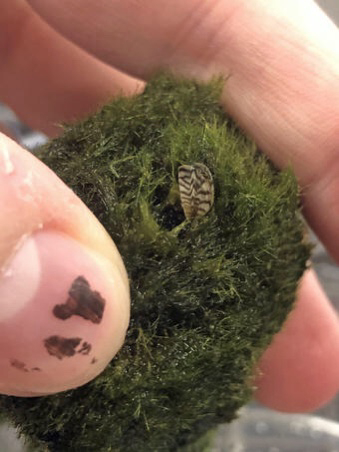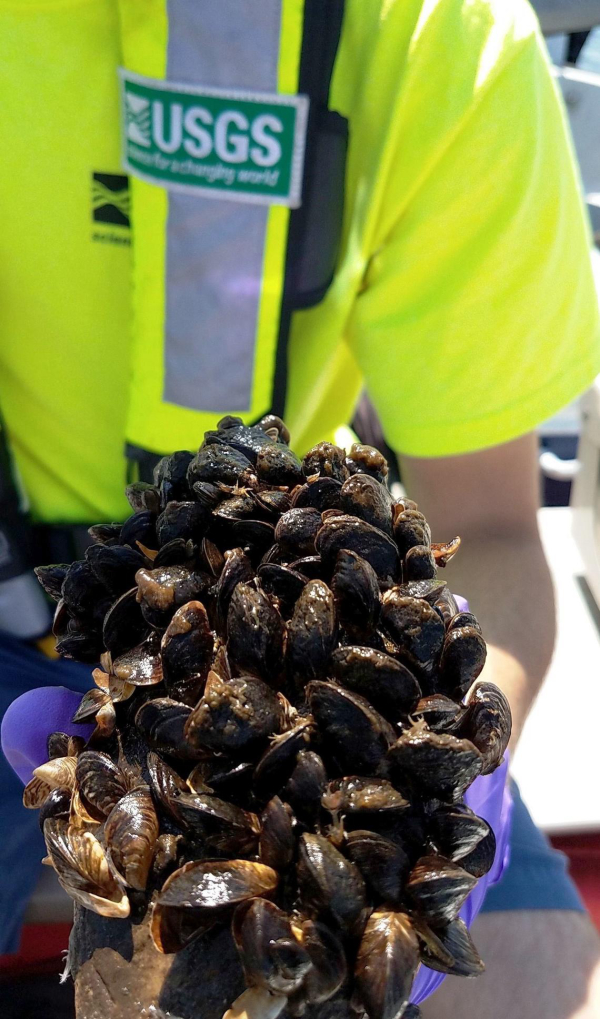Mussel Problems Unleashed

Last week, was a first report from a state agencies warning that the tiny, but pervasive zebra mussel had been found alive and well inside a “moss ball” of aquarium plants. Today, it seems that first warning was only a harbinger of problems ahead. The trickle of reports became a flood.
Yesterday, the Association of Fish and Wildlife Agencies (AFWA) reached out, wanting help to spread the word. As they pointed out, the zebra mussel has proven “impossible to eradicate once a colony is established, causing irreversible ecosystem damage, destroying habitat, and killing native species.”
That’s a lot of damage from a teeny little mollusk, but anyone who’s seen the damage caused to the Great Lakes and anything that’s floating on or attached to them that’s had a little visit from the zebra mussel understands it’s really not an overstatement.
Initially, the “moss ball” products that have included the mussels were thought to have been sold in Petco and PetSmart stores around the country. Now, it seems the problem was far more pervasive as the “moss balls” were also sold online as well- and shipped nationwide. If you bought a “Betta Buddy Marimo Ball” or “Mini Marimo Moss Ball” you may have unintentionally brought an invasive species into your aquarium. It seems that these have even been included with the purchase of betta fish. Both Petco and PetSmart have discontinued selling them, but everyone is being asked to be on the alert.
But there’s another warning: if you find you have one of the moss balls, don’t think just tossing them handles the problem. The moss balls have to be killed before being disposed of. Simply tossing them only gives the zebra mussels another opportunity to spread.
Officials tell us you have three options: Freeze ‘em. Boil ‘em. Bleach/Vinegar ‘em.
If you put the moss ball in a sealed plastic bag and freeze it for 24 hours, that’ll do the job. Putting the moss ball into boiling water for at least a minute will also work.
Or, you could submerge the moss ball into chlorine bleach or undiluted white vinegar for 20 minutes.
Of course, options two and three mean you then have to dispose of the fluids. We’re told you can simply pour them down the drain, but you should never dump them into the storm drains.
If you had a moss ball in your aquarium, there’s still work to do. You’ll have to drain and totally clean your aquarium. And you’ll need to place your fish or other critter in clean water -from another source. This isn’t just another aquarium cleaning- so don’t treat it like one. After emptying and cleaning the aquarium, you’ll need to fill it with a solution of water and once cup of bleach for each gallon of water. Let it sit for 10 minutes or more, then pour that water down the drain.
Here’s the AFWA’s recommendation for cleaning the rest of your aquarium gear:
Clean the aquarium and accessories using one of the following methods, ensuring that the disposal method you choose is in accordance with manufacturers’ recommendations:
- Hot Water Method:
-
- Use water that is 140 degrees F to flush and coat the tank and all accessory surfaces for at least one minute, OR
- Disinfection Method:
-
- Submerge the moss ball in 1 cup of chlorine bleach per gallon of water for 10 minutes or undiluted white vinegar for 20 minutes.
- Soak the aquarium, substrate, rocks, décor, and filter media in the bleach water solution for 10 minutes.
- Rinse off all items prior to setting up the aquarium.
- Dispose of the previously used filter media and replace with new media.
- Use a dechlorinating product to neutralize any residual chlorine prior to reintroducing aquatic life.

They might look tiny in a moss ball, but they quickly take over whatever they attach to-including boat anchors. USGS photo with permission.
|
It is recommended that you do another water change within a week and continue to monitor the tank for any unusual or unexpected aquatic life.
“We see the devastation caused by zebra mussels in systems such as the Great Lakes,” said Ron Regan, Executive Director of the Association of Fish and Wildlife Agencies. “State agencies and our federal partners are fighting an uphill battle against invasive species and this underscores the urgent need for more public attention, increased resources, and new management tools to stop them from spreading.”
A tiny zebra mussel might not seem that big a deal, until you’ve seen the damage they do to everything from fresh water intakes at treatment plants to propellers on pleasure boats. They’re no joke.
They’re not as big, frightening or aggressive as the reptiles threatening to overrun Florida’s Everglades, but they’re a threat none of us should take lightly.






